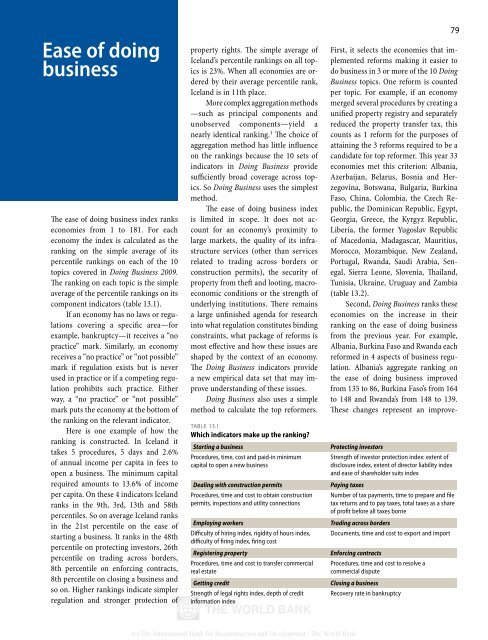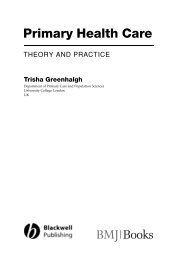DOING BUSINESS 2009 - JOHN J. HADDAD, Ph.D.
DOING BUSINESS 2009 - JOHN J. HADDAD, Ph.D.
DOING BUSINESS 2009 - JOHN J. HADDAD, Ph.D.
Create successful ePaper yourself
Turn your PDF publications into a flip-book with our unique Google optimized e-Paper software.
Ease of doingbusinessThe ease of doing business index rankseconomies from 1 to 181. For eacheconomy the index is calculated as theranking on the simple average of itspercentile rankings on each of the 10topics covered in Doing Business <strong>2009</strong>.The ranking on each topic is the simpleaverage of the percentile rankings on itscomponent indicators (table 13.1).If an economy has no laws or regulationscovering a specific area—forexample, bankruptcy—it receives a “nopractice” mark. Similarly, an economyreceives a “no practice” or “not possible”mark if regulation exists but is neverused in practice or if a competing regulationprohibits such practice. Eitherway, a “no practice” or “not possible”mark puts the economy at the bottom ofthe ranking on the relevant indicator.Here is one example of how theranking is constructed. In Iceland ittakes 5 procedures, 5 days and 2.6%of annual income per capita in fees toopen a business. The minimum capitalrequired amounts to 13.6% of incomeper capita. On these 4 indicators Icelandranks in the 9th, 3rd, 13th and 58thpercentiles. So on average Iceland ranksin the 21st percentile on the ease ofstarting a business. It ranks in the 48thpercentile on protecting investors, 26thpercentile on trading across borders,8th percentile on enforcing contracts,8th percentile on closing a business andso on. Higher rankings indicate simplerregulation and stronger protection ofproperty rights. The simple average ofIceland’s percentile rankings on all topicsis 23%. When all economies are orderedby their average percentile rank,Iceland is in 11th place.More complex aggregation methods—such as principal components andunobserved components—yield anearly identical ranking. 1 The choice ofaggregation method has little influenceon the rankings because the 10 sets ofindicators in Doing Business providesufficiently broad coverage across topics.So Doing Business uses the simplestmethod.The ease of doing business indexis limited in scope. It does not accountfor an economy’s proximity tolarge markets, the quality of its infrastructureservices (other than servicesrelated to trading across borders orconstruction permits), the security ofproperty from theft and looting, macroeconomicconditions or the strength ofunderlying institutions. There remainsa large unfinished agenda for researchinto what regulation constitutes bindingconstraints, what package of reforms ismost effective and how these issues areshaped by the context of an economy.The Doing Business indicators providea new empirical data set that may improveunderstanding of these issues.Doing Business also uses a simplemethod to calculate the top reformers.Table 13.1Which indicators make up the ranking?Starting a businessProcedures, time, cost and paid-in minimumcapital to open a new businessDealing with construction permitsProcedures, time and cost to obtain constructionpermits, inspections and utility connectionsEmploying workersDifficulty of hiring index, rigidity of hours index,difficulty of firing index, firing costRegistering propertyProcedures, time and cost to transfer commercialreal estateGetting creditStrength of legal rights index, depth of creditinformation index79First, it selects the economies that implementedreforms making it easier todo business in 3 or more of the 10 DoingBusiness topics. One reform is countedper topic. For example, if an economymerged several procedures by creating aunified property registry and separatelyreduced the property transfer tax, thiscounts as 1 reform for the purposes ofattaining the 3 reforms required to be acandidate for top reformer. This year 33economies met this criterion: Albania,Azerbaijan, Belarus, Bosnia and Herzegovina,Botswana, Bulgaria, BurkinaFaso, China, Colombia, the Czech Republic,the Dominican Republic, Egypt,Georgia, Greece, the Kyrgyz Republic,Liberia, the former Yugoslav Republicof Macedonia, Madagascar, Mauritius,Morocco, Mozambique, New Zealand,Portugal, Rwanda, Saudi Arabia, Senegal,Sierra Leone, Slovenia, Thailand,Tunisia, Ukraine, Uruguay and Zambia(table 13.2).Second, Doing Business ranks theseeconomies on the increase in theirranking on the ease of doing businessfrom the previous year. For example,Albania, Burkina Faso and Rwanda eachreformed in 4 aspects of business regulation.Albania’s aggregate ranking onthe ease of doing business improvedfrom 135 to 86, Burkina Faso’s from 164to 148 and Rwanda’s from 148 to 139.These changes represent an improve-Protecting investorsStrength of investor protection index: extent ofdisclosure index, extent of director liability indexand ease of shareholder suits indexPaying taxesNumber of tax payments, time to prepare and filetax returns and to pay taxes, total taxes as a shareof profit before all taxes borneTrading across bordersDocuments, time and cost to export and importEnforcing contractsProcedures, time and cost to resolve acommercial disputeClosing a businessRecovery rate in bankruptcy(c) The International Bank for Reconstruction and Development / The World Bank
















